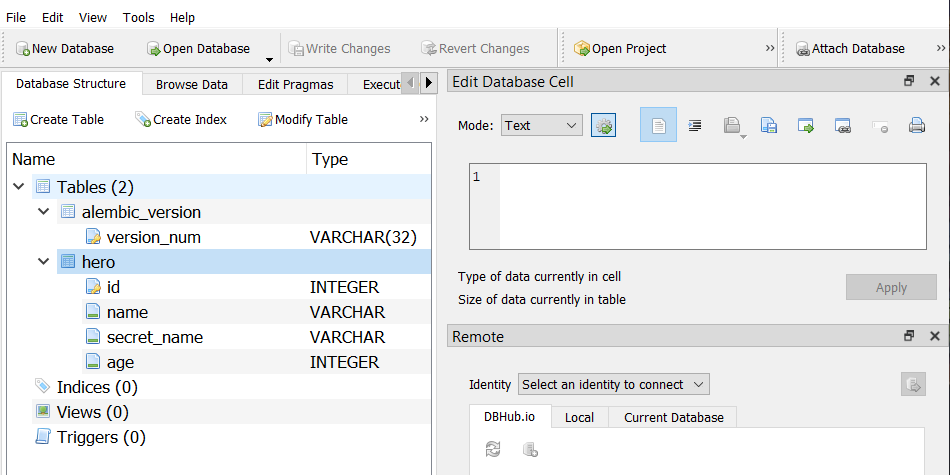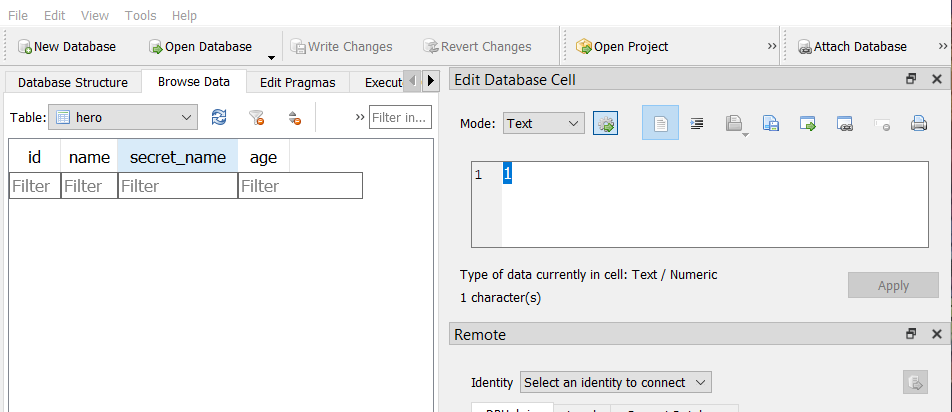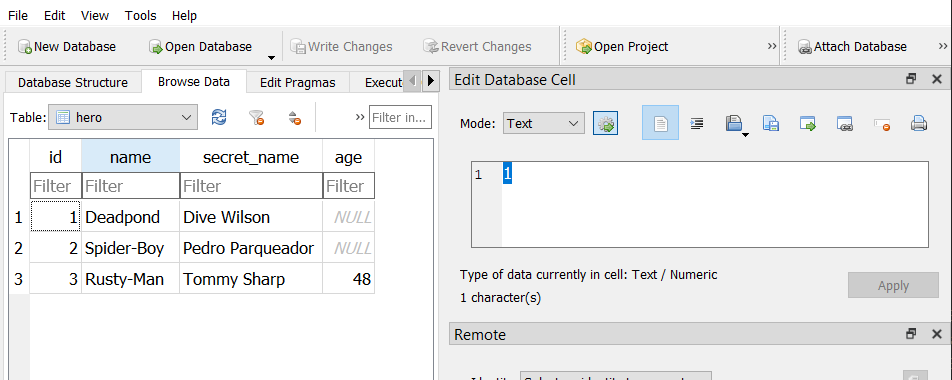Migrations¶
We will use Alembic to handle database schema changes.
SQLModel is compatible with Alembic.
Initial example¶
We'll continue from another example that has the creation of database and tables, and other essentials features.
👀 Full file example
from typing import Optional
from sqlmodel import Field, Session, SQLModel, create_engine, select
class Hero(SQLModel, table=True):
id: Optional[int] = Field(default=None, primary_key=True)
name: str
secret_name: str
age: Optional[int] = None
sqlite_file_name = "database.db"
sqlite_url = f"sqlite:///{sqlite_file_name}"
engine = create_engine(sqlite_url, echo=True)
def create_db_and_tables():
SQLModel.metadata.create_all(engine)
def create_heroes():
hero_1 = Hero(name="Deadpond", secret_name="Dive Wilson")
hero_2 = Hero(name="Spider-Boy", secret_name="Pedro Parqueador")
hero_3 = Hero(name="Rusty-Man", secret_name="Tommy Sharp", age=48)
with Session(engine) as session:
session.add(hero_1)
session.add(hero_2)
session.add(hero_3)
session.commit()
def select_heroes():
with Session(engine) as session:
statement = select(Hero)
results = session.exec(statement)
for hero in results:
print(hero)
def main():
create_db_and_tables()
create_heroes()
select_heroes()
if __name__ == "__main__":
main()
First step¶
Add Alembic to your project.
Example using pip.
$ pip install alembic
Installing collected packages: alembic
Successfully installed alembic-1.8.1
Clean your code¶
We need to clean our step that create the database and tables.
# Code above omitted 👆
def create_db_and_tables():
SQLModel.metadata.create_all(engine)
# Code below omitted 👇
# Code above omitted 👆
def main():
create_db_and_tables()
create_heroes()
select_heroes()
# Code below omitted 👇
👀 Full file example
from typing import Optional
from sqlmodel import Field, Session, SQLModel, create_engine, select
class Hero(SQLModel, table=True):
id: Optional[int] = Field(default=None, primary_key=True)
name: str
secret_name: str
age: Optional[int] = None
sqlite_file_name = "database.db"
sqlite_url = f"sqlite:///{sqlite_file_name}"
engine = create_engine(sqlite_url, echo=True)
def create_heroes():
hero_1 = Hero(name="Deadpond", secret_name="Dive Wilson")
hero_2 = Hero(name="Spider-Boy", secret_name="Pedro Parqueador")
hero_3 = Hero(name="Rusty-Man", secret_name="Tommy Sharp", age=48)
with Session(engine) as session:
session.add(hero_1)
session.add(hero_2)
session.add(hero_3)
session.commit()
def select_heroes():
with Session(engine) as session:
statement = select(Hero)
results = session.exec(statement)
for hero in results:
print(hero)
def main():
create_heroes()
select_heroes()
if __name__ == "__main__":
main()
Alembic configuration¶
In this step we need initialize alembic.
$ alembic init migrations
Creating directory migrations ... done
Creating directory migrations\versions ... done
Generating alembic.ini ... done
Generating migrations\env.py ... done
Generating migrations\README ... done
Generating migrations\script.py.mako ... done
Please edit configuration/connection/logging settings in 'alembic.ini' before proceeding.
!!! info
We can also use alembic init alembic to create alembic folder instead of migrations folder.
Then go to migrations\script.py.mako to add sqlmodel module.
# Code above omitted 👆
from alembic import op
import sqlalchemy as sa
import sqlmodel
# Code below omitted 👇
!!! info In new migrations alembic will add SQLModel automatically.
👀 Full script.py.mako example
"""${message}
Revision ID: ${up_revision}
Revises: ${down_revision | comma,n}
Create Date: ${create_date}
"""
from alembic import op
import sqlalchemy as sa
import sqlmodel
${imports if imports else ""}
# revision identifiers, used by Alembic.
revision = ${repr(up_revision)}
down_revision = ${repr(down_revision)}
branch_labels = ${repr(branch_labels)}
depends_on = ${repr(depends_on)}
def upgrade() -> None:
${upgrades if upgrades else "pass"}
def downgrade() -> None:
${downgrades if downgrades else "pass"}
Then go to migrations\env.py to finish the alembic configuration.
- Import your models (in this case
Hero) andSQLModel
# Code above omitted 👆
from logging.config import fileConfig # isort:skip
from main import Hero # noqa: F401, isort:skip
from sqlmodel import SQLModel # isort:skip
from sqlalchemy import engine_from_config # isort:skip
# Code below omitted 👇
Warning
First import your models and then import SQLModel otherwise sqlmodel doesn´t recognize all models.
- Then set your database url
# Code above omitted 👆
config = context.config
config.set_main_option("sqlalchemy.url", "sqlite:///database.db")
# Code below omitted 👇
Tip
This step can be replaced setting the same `sqlalchemy.url` variable in `alembic.ini` file.
- Finally set
target_metadatawith yourSQLModel.metada
# Code above omitted 👆
target_metadata = SQLModel.metadata
# Code below omitted 👇
👀 Full env.py example
from logging.config import fileConfig # isort:skip
from main import Hero # noqa: F401, isort:skip
from sqlmodel import SQLModel # isort:skip
from sqlalchemy import engine_from_config # isort:skip
from sqlalchemy import pool # isort:skip
from alembic import context # isort:skip
# this is the Alembic Config object, which provides
# access to the values within the .ini file in use.
config = context.config
config.set_main_option("sqlalchemy.url", "sqlite:///database.db")
# Interpret the config file for Python logging.
# This line sets up loggers basically.
if config.config_file_name is not None:
fileConfig(config.config_file_name)
# add your model's MetaData object here
# for 'autogenerate' support
# from myapp import mymodel
# target_metadata = mymodel.Base.metadata
target_metadata = SQLModel.metadata
# other values from the config, defined by the needs of env.py,
# can be acquired:
# my_important_option = config.get_main_option("my_important_option")
# ... etc.
def run_migrations_offline() -> None:
"""Run migrations in 'offline' mode.
This configures the context with just a URL
and not an Engine, though an Engine is acceptable
here as well. By skipping the Engine creation
we don't even need a DBAPI to be available.
Calls to context.execute() here emit the given string to the
script output.
"""
url = config.get_main_option("sqlalchemy.url")
context.configure(
url=url,
target_metadata=target_metadata,
literal_binds=True,
dialect_opts={"paramstyle": "named"},
)
with context.begin_transaction():
context.run_migrations()
def run_migrations_online() -> None:
"""Run migrations in 'online' mode.
In this scenario we need to create an Engine
and associate a connection with the context.
"""
connectable = engine_from_config(
config.get_section(config.config_ini_section),
prefix="sqlalchemy.",
poolclass=pool.NullPool,
)
with connectable.connect() as connection:
context.configure(connection=connection, target_metadata=target_metadata)
with context.begin_transaction():
context.run_migrations()
if context.is_offline_mode():
run_migrations_offline()
else:
run_migrations_online()
Run migrations¶
In this step we need to generate the initial version of the database.
$ alembic revision --autogenerate -m "init_db"
INFO [alembic.runtime.migration] Context impl SQLiteImpl.
INFO [alembic.runtime.migration] Will assume non-transactional DDL.
INFO [alembic.autogenerate.compare] Detected added table 'hero'
Generating migrations\versions\34abfb7ac266_init_db.py ... done
Now in versions folder we have a new file called 34abfb7ac266_init_db.py
Info
This file has a revision id and the message part from our revision command.
"""init_db
Revision ID: 34abfb7ac266
Revises:
Create Date:
"""
from alembic import op # isort:skip
import sqlalchemy as sa # isort:skip
import sqlmodel # (1), # isort:skip
# revision identifiers, used by Alembic.
revision = "34abfb7ac266"
down_revision = None
branch_labels = None
depends_on = None
def upgrade() -> None: # (2)
# ### commands auto generated by Alembic - please adjust! ###
op.create_table(
"hero", # (3)
sa.Column("id", sa.Integer(), nullable=False), # (4)
sa.Column("name", sqlmodel.sql.sqltypes.AutoString(), nullable=False), # (5)
sa.Column(
"secret_name", sqlmodel.sql.sqltypes.AutoString(), nullable=False
), # (6)
sa.Column("age", sa.Integer(), nullable=True), # (7)
sa.PrimaryKeyConstraint("id"), # (8)
)
# ### end Alembic commands ###
def downgrade() -> None: # (9)
# ### commands auto generated by Alembic - please adjust! ###
op.drop_table("hero") # (10)
# ### end Alembic commands ###
- SQLmodel import
- Upgrade function to add the new schema in the database
- Create a new table named
hero idfieldnamefieldsecret_namefieldagefield- Setting
idfield as primary key - Downgrade function to rollback our changes
- Delete the table named
hero
Success
At this moment we have all the files to create our new database model.
Initialize the database:
$ alembic upgrade head
INFO [alembic.runtime.migration] Context impl SQLiteImpl.
INFO [alembic.runtime.migration] Will assume non-transactional DDL.
INFO [alembic.runtime.migration] Running upgrade -> 34abfb7ac266, init_db
Now we have two tables:
alembic_version: with the version_num asociate with the revision idhero: the new table from our model

Hero table is empty.

Then run main.py script
$ python main.py
INFO sqlalchemy.engine.Engine BEGIN (implicit)
INFO sqlalchemy.engine.Engine INSERT INTO hero (name, secret_name, age) VALUES (?, ?, ?)
INFO sqlalchemy.engine.Engine [generated in 0.00035s] ('Deadpond', 'Dive Wilson', None)
INFO sqlalchemy.engine.Engine INSERT INTO hero (name, secret_name, age) VALUES (?, ?, ?)
INFO sqlalchemy.engine.Engine [cached since 0.002439s ago] ('Spider-Boy', 'Pedro Parqueador', None)
INFO sqlalchemy.engine.Engine INSERT INTO hero (name, secret_name, age) VALUES (?, ?, ?)
INFO sqlalchemy.engine.Engine [cached since 0.003134s ago] ('Rusty-Man', 'Tommy Sharp', 48)
INFO sqlalchemy.engine.Engine COMMIT
INFO sqlalchemy.engine.Engine BEGIN (implicit)
INFO sqlalchemy.engine.Engine SELECT hero.id, hero.name, hero.secret_name, hero.age
FROM hero
INFO sqlalchemy.engine.Engine [generated in 0.00038s] ()
age=None id=1 name='Deadpond' secret_name='Dive Wilson'
age=None id=2 name='Spider-Boy' secret_name='Pedro Parqueador'
age=48 id=3 name='Rusty-Man' secret_name='Tommy Sharp'
INFO sqlalchemy.engine.Engine ROLLBACK
Now the hero table has new rows:

Next steps¶
If we edit our model changing the database schema we can run again alembic to generate a new revision.
Example: adding a new field named power
# Code above omitted 👆
age: Optional[int] = None
power: int = None
# Code below omitted 👇
👀 Full file example
from typing import Optional
from sqlmodel import Field, Session, SQLModel, create_engine, select
class Hero(SQLModel, table=True):
id: Optional[int] = Field(default=None, primary_key=True)
name: str
secret_name: str
age: Optional[int] = None
power: int = None
sqlite_file_name = "database.db"
sqlite_url = f"sqlite:///{sqlite_file_name}"
engine = create_engine(sqlite_url, echo=True)
def create_heroes():
hero_1 = Hero(name="Deadpond", secret_name="Dive Wilson")
hero_2 = Hero(name="Spider-Boy", secret_name="Pedro Parqueador")
hero_3 = Hero(name="Rusty-Man", secret_name="Tommy Sharp", age=48)
with Session(engine) as session:
session.add(hero_1)
session.add(hero_2)
session.add(hero_3)
session.commit()
def select_heroes():
with Session(engine) as session:
statement = select(Hero)
results = session.exec(statement)
for hero in results:
print(hero)
def main():
create_heroes()
select_heroes()
if __name__ == "__main__":
main()
$ alembic revision --autogenerate -m "new field power"
INFO [alembic.runtime.migration] Context impl SQLiteImpl.
INFO [alembic.runtime.migration] Will assume non-transactional DDL.
INFO [alembic.autogenerate.compare] Detected added column 'hero.power'
Generating migrations\versions\b39b8d3c77f0_new_field_power.py ... done
The new file b39b8d3c77f0_new_field_power.py:
"""new field power
Revision ID: b39b8d3c77f0
Revises: 357d6ebcfadf
Create Date:
"""
from alembic import op # isort:skip
import sqlalchemy as sa # isort:skip
import sqlmodel # noqa: F401, isort:skip
# revision identifiers, used by Alembic.
revision = "b39b8d3c77f0" # (1)
down_revision = "357d6ebcfadf" # (2)
branch_labels = None
depends_on = None
def upgrade() -> None:
# ### commands auto generated by Alembic - please adjust! ###
op.add_column("hero", sa.Column("power", sa.Integer(), nullable=True)) # (3)
# ### end Alembic commands ###
def downgrade() -> None:
# ### commands auto generated by Alembic - please adjust! ###
op.drop_column("hero", "power") # (4)
# ### end Alembic commands ###
- New revision id
- Previous revision id, if downgrade go to this revision id
powernew field- Drop column if downgrade
Note
Run `alembic upgrade head` to add the new field named power
$ alembic upgrade head
INFO [alembic.runtime.migration] Context impl SQLiteImpl.
INFO [alembic.runtime.migration] Will assume non-transactional DDL.
INFO [alembic.runtime.migration] Running upgrade 357d6ebcfadf -> b39b8d3c77f0, new field power
Note
After you can downgrade the database to the previous version, run `alembic downgrade -1`
$ alembic downgrade -1
INFO [alembic.runtime.migration] Context impl SQLiteImpl.
INFO [alembic.runtime.migration] Will assume non-transactional DDL.
INFO [alembic.runtime.migration] Running downgrade b39b8d3c77f0 -> 357d6ebcfadf, new field power
Success
Migrations complete!!! Try adding new tables and relationship.